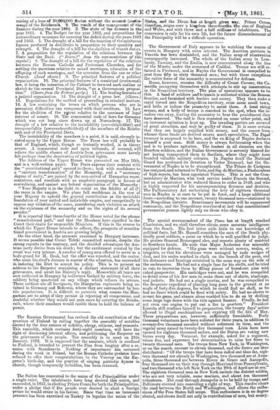The Government of Italy appears to be watching the course
of events in Hungary with some interest. The Austrian garrison in Venetia has been diminished, and the Italian army +of observation consequently increased. The whole of the Italian army in Lom- bardy, Tuscany, and the Emilia, is now concentrated along the line of the Mincio, under the command of Cialdini. Troops are still re- tained in Piedmont, and in Naples the Government is compelled to post from fifty to sixty thousand men; but with these exceptions the entire force of the monarchy is eoncentrated for defence.
Rome, however, remains the difficulty of 'Count Caveur, the Ca- marina occupying themselves with attempts to stir up insurrection in the Neapolitan territory. The plan of operations appears to be this. A band of soldiers .and brigands is collected within the Roman frontier, and furnished with leaders and money. They then make a rapid inroad into the Neapolitan territory, seize some small town, and bribe or induce the peasantry to assist them. A local rising occurs, and a body of troops is marched to the spot, when the in- vaders run away, leaving the peasantry to bear tie punishment they have deserved. The raid is then repeated on some other point, and an incessant agitation is kept up. The invading parties are accused of great atrocities, and may be guilty of them It is more certain that they are largely supplied with money, and the source from , whence these funds are derived causes much speculation. The Papal treasury is supposed to be bare, and the ex-King of Naples declares himself •a poor man. Still money is always forthcoming when the end is to produce agitation. The leaders in all emeutes are the Bourbon soldiers, and the Italian Government is severely blamed for not having transported them to Sardinia, where they might have founded valuable military colonies. In Naples itself the National Guard has professed its devotion to Victor Emanuel, bat the Go- vernment of Naples is to be strengthened. The Prince de 'Carignan has reaigned,and returned to Turin, and Sig. de Martino, a Piedmoutese of high repute, has been appointed Viceroy. This is not the Corn- mendatore de Martino, who took service under Francis the Second, but an administrator who reduced Genoa to order in 1849, and who is highly- respected for his uncompromising firmness and decision. The Parliamentary Act authorizing the levy of eighteen thousand men in Naples is at once to be put in force, and a large additional force—according to one account, twenty thousand men—stationed in the Neapolitan districts. Reactionary movements will be suppressed summarily, and the Neapolitans convinced at last that constitutional government presses lightly only on those who obey it.






























 Previous page
Previous page